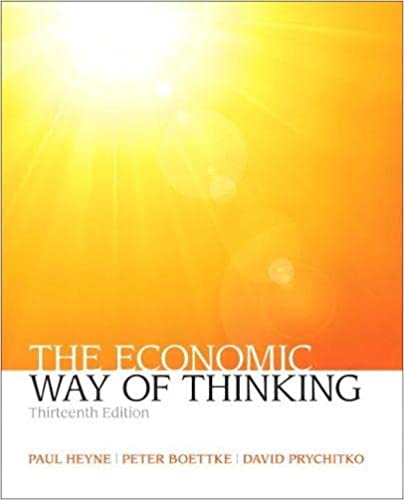
The Economic Way of Thinking 13th Edition by David Prychitko, Peter Boettke, Paul Heyne
Edition 13ISBN: 9780132992695
The Economic Way of Thinking 13th Edition by David Prychitko, Peter Boettke, Paul Heyne
Edition 13ISBN: 9780132992695 Exercise 13
When Missouri began assessing commercial property for tax purposes at a higher percentage of "fair market value" than residential property, apartment buildings of five or more units were classified as commercial property. Property taxes on such buildings consequently increased sharply, while taxes on apartment buildings with four units or fewer did not change.
(a) Would you expect this change to increase the rents paid by people living in large apartment buildings relative to the rents paid by tenants in buildings with fewer than five units? Does the tax increase affect either the marginal cost to the landlord of renting or the demand for apartments on the part of tenants?
(b) What effect do you think this tax change will have on the average size of apartment units in existing buildings? What effect will it have on the average size of apartment buildings constructed in the future?
(c) What effect would you predict from this change in assessment methods on the rental rates tenants will pay?
(d) The president of the St. Louis Apartment Association was quoted as saying that no apartment owners would pay those tax increases, but rather would pass them along in the form of rent increases. If owners can raise rents in this fashion after property taxes rise, why don't they raise them before the taxes rise and thus increase their income? If owners can pass on tax increases, why did some Missouri apartment owners go to the expense of filing a suit to overturn the reassessment?
(a) Would you expect this change to increase the rents paid by people living in large apartment buildings relative to the rents paid by tenants in buildings with fewer than five units? Does the tax increase affect either the marginal cost to the landlord of renting or the demand for apartments on the part of tenants?
(b) What effect do you think this tax change will have on the average size of apartment units in existing buildings? What effect will it have on the average size of apartment buildings constructed in the future?
(c) What effect would you predict from this change in assessment methods on the rental rates tenants will pay?
(d) The president of the St. Louis Apartment Association was quoted as saying that no apartment owners would pay those tax increases, but rather would pass them along in the form of rent increases. If owners can raise rents in this fashion after property taxes rise, why don't they raise them before the taxes rise and thus increase their income? If owners can pass on tax increases, why did some Missouri apartment owners go to the expense of filing a suit to overturn the reassessment?
Explanation
Income Tax is the tax that is levied on ...
The Economic Way of Thinking 13th Edition by David Prychitko, Peter Boettke, Paul Heyne
Why don’t you like this exercise?
Other Minimum 8 character and maximum 255 character
Character 255


